英语不能用被动语态的情况
学习英语被动语态的几个问题
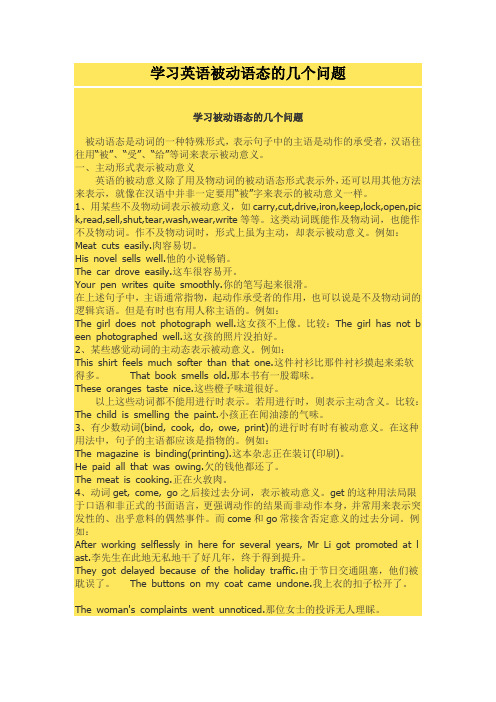
学习英语被动语态的几个问题学习被动语态的几个问题被动语态是动词的一种特殊形式,表示句子中的主语是动作的承受者,汉语往往用“被”、“受”、“给”等词来表示被动意义。
一、主动形式表示被动意义英语的被动意义除了用及物动词的被动语态形式表示外,还可以用其他方法来表示,就像在汉语中并非一定要用“被”字来表示的被动意义一样。
1、用某些不及物动词表示被动意义,如carry,cut,drive,iron,keep,lock,open,pic k,read,sell,shut,tear,wash,wear,write等等。
这类动词既能作及物动词,也能作不及物动词。
作不及物动词时,形式上虽为主动,却表示被动意义。
例如:Meat cuts easily.肉容易切。
His novel sells well.他的小说畅销。
The car drove easily.这车很容易开。
Your pen writes quite smoothly.你的笔写起来很滑。
在上述句子中,主语通常指物,起动作承受者的作用,也可以说是不及物动词的逻辑宾语。
但是有时也有用人称主语的。
例如:The girl does not photograph well.这女孩不上像。
比较:The girl has not b een photographed well.这女孩的照片没拍好。
2、某些感觉动词的主动态表示被动意义。
例如:This shirt feels much softer than that one.这件衬衫比那件衬衫摸起来柔软得多。
That book smells old.那本书有一股霉味。
These oranges taste nice.这些橙子味道很好。
以上这些动词都不能用进行时表示。
若用进行时,则表示主动含义。
比较:The child is smelling the paint.小孩正在闻油漆的气味。
3、有少数动词(bind, cook, do, owe, print)的进行时有时有被动意义。
2019-2020新课堂英语选修八北师大版讲义:Unit 22-5 Word版含答案
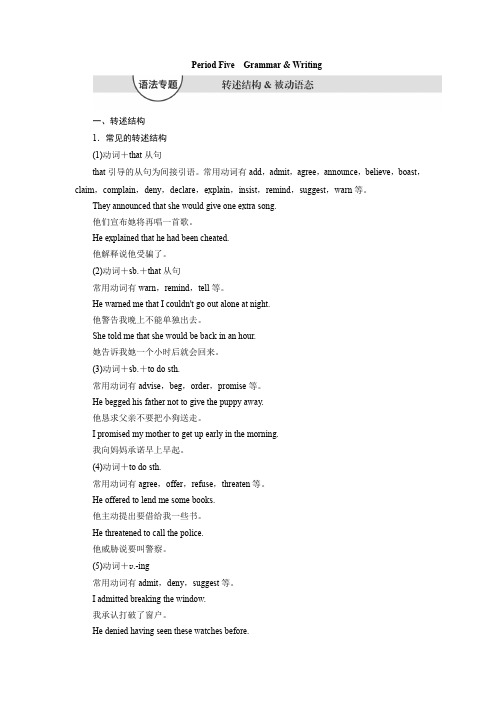
Period Five Grammar & Writing一、转述结构1.常见的转述结构(1)动词+that从句that引导的从句为间接引语。
常用动词有add,admit,agree,announce,believe,boast,claim,complain,deny,declare,explain,insist,remind,suggest,warn等。
They announced that she would give one extra song.他们宣布她将再唱一首歌。
He explained that he had been cheated.他解释说他受骗了。
(2)动词+sb.+that从句常用动词有warn,remind,tell等。
He warned me that I couldn't go out alone at night.他警告我晚上不能单独出去。
She told me that she would be back in an hour.她告诉我她一个小时后就会回来。
(3)动词+sb.+to do sth.常用动词有advise,beg,order,promise等。
He begged his father not to give the puppy away.他恳求父亲不要把小狗送走。
I promised my mother to get up early in the morning.我向妈妈承诺早上早起。
(4)动词+to do sth.常用动词有agree,offer,refuse,threaten等。
He offered to lend me some books.他主动提出要借给我一些书。
He threatened to call the police.他威胁说要叫警察。
(5)动词+v.-ing常用动词有admit,deny,suggest等。
I admitted breaking the window.我承认打破了窗户。
初中英语语法大全:不用被动语态

初中英语语法大全:不用被动语态各位读友大家好,此文档由网络收集而来,欢迎您下载,谢谢初中英语语法大全:不用被动语态不用被动语态的情况1) 不及物动词或动词短语无被动语态:appear, die disappear, end , fail, happen, last, lie, remain, sit, spread, stand break out, come true, fall asleep, keep silence, lose heart, take place.After the fire, very little remained of my house.比较:rise, fall, happen是不及物动词;raise, seat是及物动词。
The price has been risen.The price has risen.The accident was happened last week.The accident happened last week.The price has raised.The price has been raised.Please seat.Please be seated.要想正确地使用被动语态,就须注意哪些动词是及物的,哪些是不及物的。
特别是一词多义的动词往往有两种用法。
解决这一问题唯有在学习过程中多留意积累。
2) 不能用于被动语态的及物动词或动词短语:fit, have, hold, marry, own, wish, cost, notice, watch agree with, arrive at / in, shake hands with, succeed in, suffer from, happen to, take part in, walk into, belong toThis key just fits the lock.Your story agrees with what had already been heard.3) 系动词无被动语态:appear, be become, fall, feel, get,grow, keep, look, remain, seem, smell, sound, stay, taste, turnIt sounds good.4) 带同源宾语的及物动词,反身代词,相互代词,不能用于被动语态:die, death, dream, live, lifeShe dreamed a bad dream last night.5) 当宾语是不定式时,很少用于被动语态。
英语被动态用法总结

动词的语态主语是动作的发出者时为主动语态;主语是动作的接受者时为被动语态。
常用被动语态的情况,1.一没必要指出动作的执行者时:The palace was built in 1900. He was elected president of the country.2.表客观说明的句型常用被动语态如it is said that…或可用,sb. +be + -ed+ to be(believe, consider, declare, expect, feel , report, say, see, suppose, think, understand It is said that the boy has passed the national exam. (=The boy is said to have passed the national exam. )3.有些词习惯上常用被动语态:born, dress, situate, sit不用被动语态的情况1)不及物动词或不及物动词短语,如appear, die disappear, end, fail, happen, last, lie, remain, sit, spread, stand, break out, come true, fall asleep, keep silence, lose heart, take place, fit, have, hold, marry, own, wish, cost, notice, watch, agree with, arrive at / in, shake hands with, succeed in, suffer from, happen to, take part in, walk into, belong to等无被动语态。
After the fire, very little remained of my house. This key just fits the lock. 2)系动词无被动语态,如appear, be become, fall, feel, get, grow, keep, look, remain, seem, smell, sound, stay, taste, turn等。
英语语法被动语态注意事项

英语语法被动语态注意事项CN人才网小编给大家分享了英语语法被动语态注意事项,快来看看吧。
一、要注意被动语态的不同时态被动语态由“be+过去分词”,其中的助动词 be 根据情况可使用各种不同时态。
如:She is respected by everyone. 她受到大家的尊重。
(一般现在时) The book will be reprinted soon. 这本书很快会重印。
(一般将来时)The road is being repaired. 路正在修整。
(现在进行时)They have been given a warning. 他们受到警告。
(现在完成时)二、要注意带情态动词的被动语态该结构的基本形式为“情态动词+be(或be的适当形式)+过去分词”。
这类结构非常有可能作为语境题出现在考卷中。
如:The rules must be obeyed. 这些规章制度必须遵守。
They shouldn’t have been told about it. 这事是不应当告诉他们的。
三、要注意非谓语动词的被动语态1. 不定式一般式的被动语态。
由“to be+过去分词”构成。
如:She asked to be given some work to do. 她要求给她一些工作做。
He was the last person to be asked to speak. 他是最后被邀请发言的人。
2. 不定式完成式的被动语态。
由“to have been+过去分词”构成。
如:I should like to have been told the result earlier. 我本想让人把结果早点告诉我的。
3. 现在分词一般式的被动语态。
由“being+过去分词”构成。
如:I saw him being taken away. 我看见有人把他带走了。
Being protected by a wall, he felt quite safe. 有墙作保护,他感到很安全。
【高中英语语法 语态】不用被动语态的情况英语听力
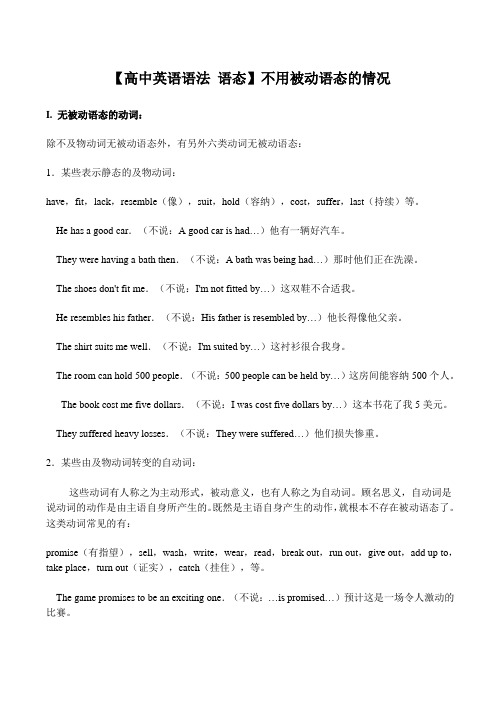
【高中英语语法语态】不用被动语态的情况I. 无被动语态的动词:除不及物动词无被动语态外,有另外六类动词无被动语态:1.某些表示静态的及物动词:have,fit,lack,resemble(像),suit,hold(容纳),cost,suffer,last(持续)等。
He has a good car.(不说:A good car is had…)他有一辆好汽车。
They were having a bath then.(不说:A bath was being had…)那时他们正在洗澡。
The shoes don't fit me.(不说:I'm not fitted by…)这双鞋不合适我。
He resembles his father.(不说:His father is resembled by…)他长得像他父亲。
The shirt suits me well.(不说:I'm suited by…)这衬衫很合我身。
The room can hold 500 people.(不说:500 people can be held by…)这房间能容纳500个人。
The book cost me five dollars.(不说:I was cost five dollars by…)这本书花了我5美元。
They suffered heavy losses.(不说:They were suffered…)他们损失惨重。
2.某些由及物动词转变的自动词:这些动词有人称之为主动形式,被动意义,也有人称之为自动词。
顾名思义,自动词是说动词的动作是由主语自身所产生的。
既然是主语自身产生的动作,就根本不存在被动语态了。
这类动词常见的有:promise(有指望),sell,wash,write,wear,read,break out,run out,give out,add up to,take place,turn out(证实),catch(挂住),等。
被动语态的用法与变化规则
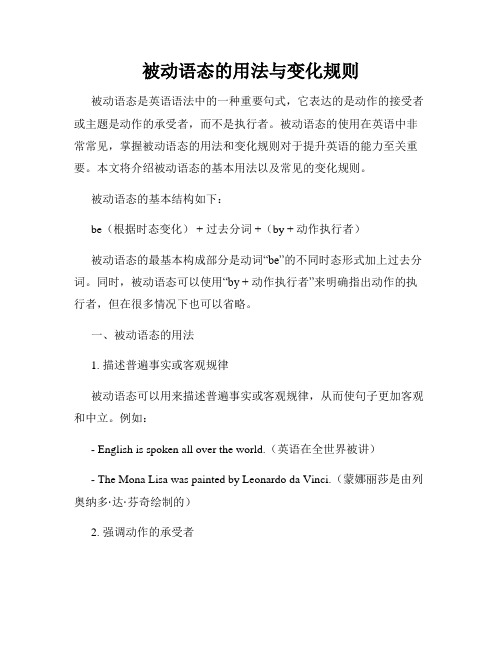
被动语态的用法与变化规则被动语态是英语语法中的一种重要句式,它表达的是动作的接受者或主题是动作的承受者,而不是执行者。
被动语态的使用在英语中非常常见,掌握被动语态的用法和变化规则对于提升英语的能力至关重要。
本文将介绍被动语态的基本用法以及常见的变化规则。
被动语态的基本结构如下:be(根据时态变化) + 过去分词 +(by + 动作执行者)被动语态的最基本构成部分是动词“be”的不同时态形式加上过去分词。
同时,被动语态可以使用“by + 动作执行者”来明确指出动作的执行者,但在很多情况下也可以省略。
一、被动语态的用法1. 描述普遍事实或客观规律被动语态可以用来描述普遍事实或客观规律,从而使句子更加客观和中立。
例如:- English is spoken all over the world.(英语在全世界被讲)- The Mona Lisa was painted by Leonardo da Vinci.(蒙娜丽莎是由列奥纳多·达·芬奇绘制的)2. 强调动作的承受者被动语态可以用来强调动作的承受者,将其置于句子的主要位置,从而达到强调的效果。
例如:- The book was written by Jane Austen.(这本书是简·奥斯汀写的)- The film was directed by Steven Spielberg.(这部电影是史蒂文·斯皮尔伯格导演的)3. 避免主语不明确或未知使用被动语态可以避免或减少主语的出现,尤其在主语是未知的情况下。
例如:- The car was stolen.(这辆车被偷了)- Mistakes were made.(出现了错误)二、被动语态的变化规则1. 时态变化被动语态的时态变化是通过改变be动词的形式来实现的。
例如:- 现在时的被动语态:am/is/are + 过去分词- 过去时的被动语态:was/were + 过去分词- 将来时的被动语态:will be + 过去分词- 现在完成时的被动语态:has/have been + 过去分词- 过去完成时的被动语态:had been + 过去分词2. 及物动词与不及物动词的被动语态变化对于及物动词来说,其被动语态的构成也较为简单,直接在动词后面加上“-ed”形式的过去分词即可。
用法02 无被动语态的情况(解析版)---备战高考英语二轮复习之英语语态“知识条目”高效练

备战2021年高考英语二轮复习之英语语态“知识条目”高效练结构2 无被动语态的情况【要点回顾】1、一般以为凡及物动词都有相应的被动句,其实不然,当“主动宾”结构的谓语动词是表示状态或特征的及物动词,如contain,cost,fit,have,lack,resemble,suit等,主动句便没有相应的被动句:Linda resembles her mother.琳达象她母亲。
This red coat becomes her.这件红上衣合她的身。
The auditorium holds 2000 people.大礼堂能容纳两千人。
My shoes don't fit me.我的鞋不合脚。
Jack always lacks confidence.杰克总是缺乏信心。
但是,状态动词know有相应的被动态:Experts have been known to make this mistake.大家知道,专家也会犯这种错误。
有时,有些不能用于被动语态的状态动词,在同一意义上,如果不用by-词组,可以有被动句。
如:All my things are held in this box.这只箱子里装着我所有的东西。
2、某些被动句没有相应的主动句。
例如:She was born in Nanjing.她生于南京。
He was said to be an honest man.据说他是个老实人。
They will be married next month.他们将于下月结婚。
Mary said that she was not obliged to work overtime.玛丽说她并不是非加班不可。
3、当“主动宾”结构的宾语为反身代词或相互代词时,通常不能转换为被动句。
例如:The doctor dedicated herself to finding a cure.这位医生为寻求一种治疗方法奉献了她的一生。
英语不能用被动语态的若干情况

英语不能用被动语态的若干情况■不及物动词没有被动语态,如rise, happen, succeed, remain, lie, disappear, last等。
如:After the fire, nothing remained.那场大火之后,什么也没留下来了。
误:After the fire, nothing was remained.■不及物动词短语没有被动语态,如:take place, break out, belong to等。
如:Great changes have taken place here since 1990.自1990年以来这里发生了巨大的变化.误:Great changes have been taken place here since 1990.■有的及物动词也没有被动语态,如cost, leave, enter, reach, suit, have, wish,hold, own, lack, fit, resemble, jump, mind等。
如:She entered the room just now.他刚才进过房间。
误:The room was entered by her just now.Tom jumped the queue.汤姆插队。
误:The queue was jumped by Tom.■有些及物的短语动词也没有被动语态,如agree with, arrive at/in, shake handswith, succeed in, suffer from, happen to, walk into, belong to等。
如:I don’t agree with him.我不同意他的看法。
误:He isn’t agreed with by me. ()■宾语是反身代词、相互代词、同源宾语、不定式、v-ing形式及抽象名词等,都不能变为被动句子的主语,如:I taught myself French.我自学法语。
高考英语 考点一遍过 考点 动词的被动语态(含解析)

落堕市安心阳光实验学校考点14 动词的被动语态高考频度:★★★★★动词的语态是历年高考的重点,也是高考的必考点。
高考主要以语法填空、短文改错等形式对被动语态这一考点进行考查,动词的语态在语法填空和短文改错中是必考点。
预计高考语态仍将是高考考查的重点和难点所在,考查形式仍以语法填空和短文改错题型为主,很可能会与动词的时态及其他的语法点结合起来进行考查。
【复习建议】1. 掌握被动语态的基本时态变化;2. 掌握被动语态的特殊结构形式;3. 掌握不能用被动语态的几种情况;4. 掌握主动形式表示被动意义的情况。
知识网络考向一被动语态的基本时态变化被动语态通常为十种时态的被动形式,被动语态由be+过去分词构成,be随时态的变化而变化。
以do为例,各种时态的被动语态形式为:被动语态的特殊结构形式(1)带情态动词的被动结构。
其形式为:情态动词+be+过去分词。
The baby should be taken good care of by the baby-sitter.(2)有些动词可以有两个宾语,在用于被动结构时,可以把主动结构中的一个宾语变为主语,另一宾语仍然保留在谓语后面。
通常变为主语的是间接宾语。
His mother gave him a present for his birthday.可改为 He was given a present by his mother for his birthday.(3)当"动词+宾语+宾语补足语"结构变为被动语态时,将宾语变为被动结构中的主语,其余不动。
Someone caught the boy smoking a cigarette.可改为The boy was caught smoking a cigarette.(4)在使役动词have, make, get以及感官动词see, watch, notice, hear, feel, observe等后面不定式作宾语补语时,在主动结构中不定式to要省略,但变为被动结构时,要加to。
中考英语语法不用被动语态的情况的知识点、考点与高频考题专题精讲(超全精编版)

B
writes good
C
D
is written good
真题再现 2. The water _____B_____ dark and dirty. It’s no longer safe to drink.
A. became B. has become C. will become
D. was becoming
A.to be breathed
B. to breathe
C. breathing
D. being breathed
解析:考查主动表被动。句意:这个退休工人喜欢早起。早晨的空气利于呼吸。在“主语+be + adj .+to do”结构中,动词不定式用主动形式表被动意义。
跟踪训练 3. I find the problems are easy _____C_____.
解析 考查动词的时态的用法。句意:对我的家乡的 新面貌我感到吃惊,因为这几年它变化很大。A. changed改变,过去式;B. changes第三人称单数 形式;C. will change一般将来时;D. has changed现在完成时。over the years.指最近几年 即从过去到现在的几年,所以用现在完成时,故选D。
跟踪训练
6. His computer, which cost him a sum of money several weeks ago, is out of order and wants C_________, though it looks very new.
B. .to be repairing
B
had been told;
washed
C
as_well_as的用法 及不用被动语态的情况

他们和我一样都邀请了你。(they和I都作invited的主语)
6. as well as 用于肯定结构和否定结构中,其意义不同。as well as 和not搭配使用,as well as 位于not前时,两者均否定;位于not后时,否定前者,肯定后者。例如:
George, as well as his brother, has gone abroad.
2. as well as 连接两个谓语动词时,它们的时态应保持一致。例如:
He publishes as well as prints his own books.
他的书是他自己印刷出版的。
We are repairing the roof as well as painting the walls.
一。常见的系动词look (看起来),sound (听起来),taste (尝起来),smell (闻起来),feel(感到),go (变得),grow (变得)等。
二、一些不能接宾语的动词短语也没有被动语态。
1.The war broke out in 1937.(break out,爆发)
We must be prepared for the worst.
类似的还有be determined to ,be absorbed in , be gone , be married to , be hidden , be interested in
……and
advanced mathematics ,experienced school , learned man 等中这些定语用的过去分词也是用过去分词表主动。
1.The thief hid himself behind the door . (宾语为反身代词)
及物动词并非都能用于被动语态

及物动词并非都能用于被动语态四川省彭州中学樊文生(该文系本人原创,曾发表于全国核心期刊《中小学外语教学》)由于被动语态不完全从属于主动语态,因此并不是所有带宾语的及物动词的主动结构都可以改为被动结构。
在不少情况下,带宾语的主动句不能改为被动句。
常见的情况有以下十六种:一. 一些表示状态的及物动词谓语是表示状态的一些及物动词,如 fail, last, suit, contain, own, hold, fit, cost, lack, want(缺少), become, flee, have(有、吃、患病)等。
例如:The hall holds 1,000 people. 大厅可容纳1,000人。
不能说:1,000 people are held in the hall.He has a new dictionary. 他有一本新字典。
I have bad colds every year. 我每年都要患重感冒。
The jacket does not fit you. 这件衣服不合你身。
We have lunch at 12:30. 我们十二点半吃午饭。
Does the pair of shoes suit you? 你穿这双鞋合适吗?Who owns this land? 这块地属谁所有?He never fails to write to his mother every week.•他每周给他妈妈写信。
The pay could last the girl only a few days. •这工资只能维持那女子几天的生活。
She lacks experience. 他缺少经验。
*但 have 一词不作“有、吃、患病”讲时,却可以有被动语态。
例如:I'm afraid you've been had.(= have been cheated) 恐怕你受骗了。
There was no butter to be had.(to be bought) 黄油买不到。
英语语法不能用被动语态的几种情况

英语语法不能用被动语态的几种情况1)某些表示“静态”的及物动词(表示状态而不是动作,而且常常是不可用于进行时态的动词)如have,fit,suit,hold(容纳),cost,suffer,last(持续)等不能用于被动语态。
如:They have a nice car. 他们有一辆漂亮的汽车。
My shoes don't fit me. 我的鞋不合适。
My brain can't hold so much information at one time. 我的脑子一下子记不住这么多资料。
How much /What does it cost?这值多少钱?Our holiday lasts 10days. 我们的假期有十天。
This food will last(them)(for)3days. 这食物足够(他们)(吃)三天。
2)不是所有带介词的动词都能用于被动结构。
若是构成成语动词通常有被动态,若不构成成语动词则无被动态。
试比较:They arrived at a decision. /A decision was arrived at. 他们作出了决定。
They arrived at the station. 他们到达车站。
(不说:The station was arrived at. )He looked into the question. /The question was looked into. 他调查了这个问题。
3)动词leave(离开),enter(进入),join(参加)这一类词不可用于被动语态。
如:The car left the road and hit a tree. 车子离开了道路,撞上了树。
4)某些及物动词可作不及物动词用,特别是后加副词(如well,easily 等)时。
主动语态有被动含义,这类动词常见的有sell,write,wear,wash,cook,open,close,lock,read,record等。
初中英语中的被动语态常见问题对策
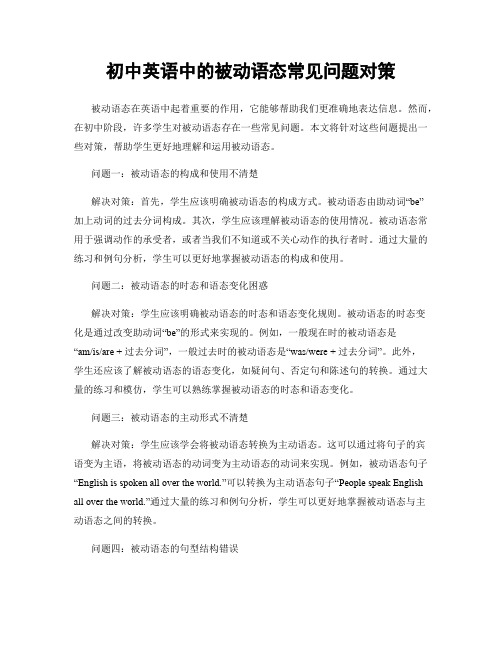
初中英语中的被动语态常见问题对策被动语态在英语中起着重要的作用,它能够帮助我们更准确地表达信息。
然而,在初中阶段,许多学生对被动语态存在一些常见问题。
本文将针对这些问题提出一些对策,帮助学生更好地理解和运用被动语态。
问题一:被动语态的构成和使用不清楚解决对策:首先,学生应该明确被动语态的构成方式。
被动语态由助动词“be”加上动词的过去分词构成。
其次,学生应该理解被动语态的使用情况。
被动语态常用于强调动作的承受者,或者当我们不知道或不关心动作的执行者时。
通过大量的练习和例句分析,学生可以更好地掌握被动语态的构成和使用。
问题二:被动语态的时态和语态变化困惑解决对策:学生应该明确被动语态的时态和语态变化规则。
被动语态的时态变化是通过改变助动词“be”的形式来实现的。
例如,一般现在时的被动语态是“am/is/are + 过去分词”,一般过去时的被动语态是“was/were + 过去分词”。
此外,学生还应该了解被动语态的语态变化,如疑问句、否定句和陈述句的转换。
通过大量的练习和模仿,学生可以熟练掌握被动语态的时态和语态变化。
问题三:被动语态的主动形式不清楚解决对策:学生应该学会将被动语态转换为主动语态。
这可以通过将句子的宾语变为主语,将被动语态的动词变为主动语态的动词来实现。
例如,被动语态句子“English is spoken all over the world.”可以转换为主动语态句子“People speak English all over th e world.”通过大量的练习和例句分析,学生可以更好地掌握被动语态与主动语态之间的转换。
问题四:被动语态的句型结构错误解决对策:学生应该注意被动语态的句型结构。
被动语态的句子结构为“主语+ be + 过去分词 + 介词短语/副词/宾语补足语”。
学生在运用被动语态时应该注意主语和谓语动词的一致性,并且正确使用介词短语、副词和宾语补足语。
通过大量的练习和句子构造,学生可以避免被动语态句型结构错误的问题。
不能用于进行时态和被动语态的动词

1. belong to属于……Our success belongs to all the people present. 我们的成功属于在座的每一个人。
2. stand, lie等静态动词这些动词表某物位于某处。
There stands a high building over there. 那边矗立着一座高高的楼房。
3. taste, feel, look, smell, sound 等感官动词This kind of food tastes good. 这种食物尝起来味道很好。
Ice always feels cold to us. 对我们来说冰摸起来总是冷的。
4. stay, keep, remain等动词The weather has stayed hot recently.最近天气一直很热。
After his election to a high office, he remained modest. 在被选为高级领导干部之后他仍然谦虚。
5. sell well( 畅销), last well(持久), wash well(耐洗), write well(写起来流畅)等动副搭配This kind of flower sells well. 这种花很畅销。
The pens produced in this factory write well .这家工厂生产的钢笔写起来流畅。
6. wash easily(易洗), break easily(易折), write smoothly(写起来流畅), light easily(易燃)等动副搭配This kind of cloth washes easily. 这种布容易洗。
It is very wet, the match does not light easily.天气很潮湿,火柴不易划着。
7. meet 遇见;碰到I met him in the street at eight yesterday morning. 昨天早晨8点钟我在街上碰到他。
英语语态:被动语态的使用的几个注意点
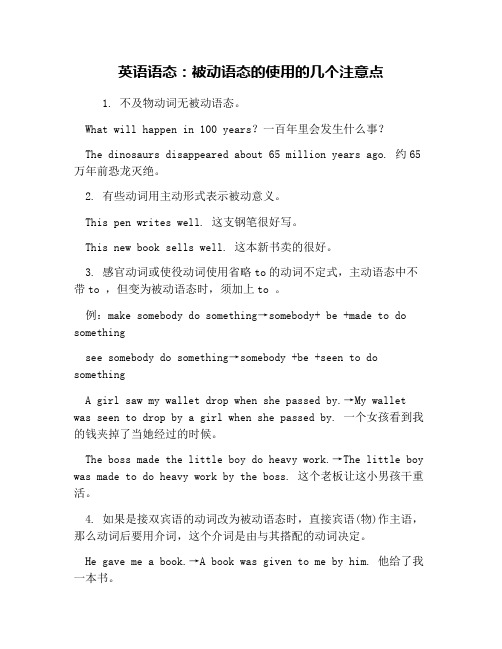
英语语态:被动语态的使用的几个注意点1. 不及物动词无被动语态。
What will happen in 100 years?一百年里会发生什么事?The dinosaurs disappeared about 65 million years ago. 约65万年前恐龙灭绝。
2. 有些动词用主动形式表示被动意义。
This pen writes well. 这支钢笔很好写。
This new book sells well. 这本新书卖的很好。
3. 感官动词或使役动词使用省略to的动词不定式,主动语态中不带to ,但变为被动语态时,须加上to 。
例:make somebody do something→somebody+ be +made to do somethingsee somebody do something→somebody +be +seen to do somethingA girl saw my wallet drop when she passed by.→My wallet was seen to drop by a girl when she passed by. 一个女孩看到我的钱夹掉了当她经过的时候。
The boss made the little boy do heavy work.→The little boy was made to do heavy work by the boss. 这个老板让这小男孩干重活。
4. 如果是接双宾语的动词改为被动语态时,直接宾语(物)作主语,那么动词后要用介词,这个介词是由与其搭配的动词决定。
He gave me a book.→A bo ok was given to me by him. 他给了我一本书。
He showed me a ticket.→A ticket was shown to me by him. 他给我展示了一张票。
- 1、下载文档前请自行甄别文档内容的完整性,平台不提供额外的编辑、内容补充、找答案等附加服务。
- 2、"仅部分预览"的文档,不可在线预览部分如存在完整性等问题,可反馈申请退款(可完整预览的文档不适用该条件!)。
- 3、如文档侵犯您的权益,请联系客服反馈,我们会尽快为您处理(人工客服工作时间:9:00-18:30)。
不能用被动语态的情况
初中语法:
1) 不及物动词或动词短语无被动语态:
appear, die disappear, end (vi. 结束), fail, happen, last, lie, remain, sit, spread, stand break out, come true, fall asleep, keep silence, lose heart, take place.
After the fire, very little remained of my house.
比较:rise, fall, happen是不及物动词;raise, seat是及物动词。
(错) The price has been risen.
(对) The price has risen.
(错) The accident was happened last week.
(对) The accident happened last week.
(错) The price has raised.
(对) The price has been raised.
(错) Please seat.
(对) Please be seated.
要想正确地使用被动语态,就须注意哪些动词是及物的,哪些是不及物的。
特别是一词多义的动词往往有两种用法。
解决这一问题唯有在学习过程中多留意积累。
2) 不能用于被动语态的及物动词或动词短语:
fit, have, hold, marry, own, wish, cost, notice, watch agree with, arrive at / in, shake hands with, succeed in, suffer from, happen to, take part in, walk into, belong to This key just fits the lock.
Your story agrees with what had already been heard.
3) 系动词无被动语态:
appear, be become, fall, feel, get, grow, keep, look, remain, seem, smell, sound, stay, taste, turn
It sounds good.
4) 带同源宾语的及物动词,反身代词,相互代词,不能用于被动语态:
die, death, dream, live, life
She dreamed a bad dream last night.
5) 当宾语是不定式时,很少用于被动语态。
(对) She likes to swim.
(错) To swim is liked by her.
高中语法:
1、所有的不及物动词和某些短语不能用被动语态,常见的有如下几个:
表示“发生”的词/短语happen ,take place, break out ,occur, catch fire,还有appear (出现), disappear(消失),belong to(属于)等。
2、常见的表示状态特征的系动词:look,feel,smell,taste,sound,prove,appear,remain等,如:
The idea sounds interesting.
Good medicine tastes bitter.
3、某些可以与easily ,well等副词连用的动词不用被动语态,如:
The cloth washed easily. 这种布很好洗。
This kind of goods sells well. 这种商品很畅销。
This car drives easily. 这部车很容易开。
常见的有read, sell, write, wash, clean, weigh, measure, wear等。
英语和汉语一样,其动作都有主动和被动之分,汉语中不是所有的动词都可采用被动结构;同样道理,英语中也有不少动词不能用于被动结构,即被动语态。
英语中,除不及物动词---即后面不能加宾语的动词不能用于被动语态外,还有下列情况不能使用被动语态的结构:
一、表示静态、容纳、适合等的及物动词。
例如:
She has a nice car.
The woolen coat fits her well.
二、宾语是动词不定式、动名词。
例如:
They promised me to go with me.
Mr.Smith wanted to have a try.
I enjoy listening to pop music.
三、宾语是反身代词。
例如:
She hurt herself this morning.
They warned themselves to be careful.
四、宾语是人身上的一部分或器官。
例如:
He put his hand on his chest and began to cough.
I could hardly believe my ears.
五、宾语是相互代词。
例如:
They help each other in study.
We must learn from each other.
六、表示地点、处所、机构、团体、组织的名词作宾语。
例如:
She joined the Party last year.
My dad reached Beijing this afternoon.
七、宾语表示行为、方式,在意义上相当于状语。
例如:
She did her best.
We shall make up our minds.
八、宾语表示数量、重量、长度、大小等,在意义上相当于状语。
例如:
They walked two miles.
The film lasted one and a half hours.
This desk weighs 10kilograms.
九、系动词sound,look,become,appear等也不能用于被动语态。
例如:
Miss Li became a doctor ten years ago.
This plan sounds a good one.
十、一些词,如happen,take place,occur,last,belong to等等,在汉语角度看来可用被动结构,但英语只能用主动结构。
例如:
Great changes have taken place in my hometown since 1949.
This car belongs to my uncle.
十一、及物动词及其宾语在意义上构成不可分割的固定词组。
例如:
I made faces to have the baby laugh.
We should never lose heart.
十二、一些宾语从句也不能变成被动语态,否则意义就变了。
例如:
I knew that I was wrong then.(我认识到当时我错了。
)
It was known that I was wrong then.
=I was known to be wrong then.(人们知道当时我错了。
)
十三、当宾语是抽象名词时。
例如:
We showed special interest in science.
十四、当宾语为同源宾语时。
例如:
We lived a hard life in the old days.
总之,能否用被动语态,除了应了解英语的一些语法规则之外,还要充分考虑汉语的说话习惯,掌握其普通规律,同时注意一些特殊情况,否则就会出现"中国式英语",也没法学到"地道的英语"。
